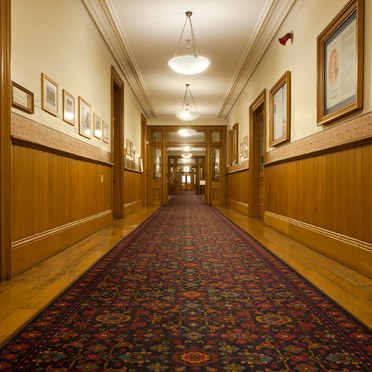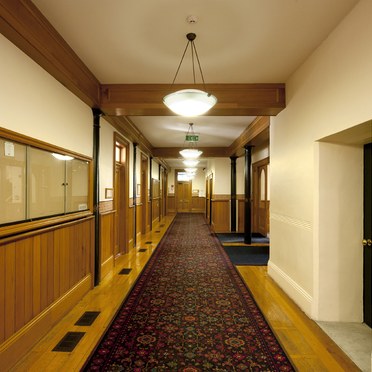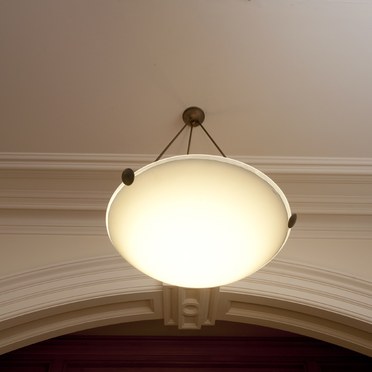Old Government Buildings, New Zealand
- Lamp efficacy
Lamp efficacy
Replacing less efficient compact fluorescent lamp technology with LED light sources ensures optimum conversion of electricity into light, producing equivalent levels of illuminance while using less energy.
- Ballast classification
Ballast classification
Removing magnetic control gear and installing electronic drivers reduces electrical losses within the control circuit and ensures the electrical power usage is controlled more effectively, using less energy more efficiently.
- Luminaire distribution
Luminaire distribution
Controlling light emission using optics which bend and shape the light to the correct location.
- System efficacy
System efficacy
Combining optical and thermal control within the luminaire (luminaire lm/W).
- Presence/absence detection
Presence/absence detection
Presence: Lights automatically turn on/off with movement. Absence: Lights automatically turn off and must be manually switched on.
- Daylight detection
Daylight detection
Artificial lighting which responds to the natural light conditions.
- Constant illuminance
Constant illuminance
A function designed to produce correct light levels for the duration of the maintenance period.
- Task-scene setting
Task-scene setting
Allowing the user to set scenes and adapt the lighting to different tasks.
- Timed off
Timed off
Automatic cut-off can be installed to turn all lights off during unoccupied hours.
- Task lighting
Task lighting
Lighting task areas with the correct amount of light.
- Zoning of lighting
Zoning of lighting
Lighting is zoned according to area use.
- Maintenance schedule
Maintenance schedule
Maintenance must be performed in response to product age, performance and environment.
- Waste light
Waste light
Eliminating waste light which does not hit the intended target.
- Reflectance
Reflectance
Taking advantage of light which is reflected from the surface within the space.
- Visible smart metering
Visible smart metering
Results of actions can be quickly seen as increased or decreased energy use to encourage responsible energy consumption.
LED retrofit transforms efficiency at New Zealand's Government Buildings
The Government Buildings Historic Reserve, more commonly referred to as the Old Government Buildings, was commissioned in the early 1870s to house New Zealand’s civil service. It was constructed to resemble an Italian stone palace built almost entirely out of the now protected native kauri timber.
Situated on Lambton Quay in Wellington, it was completed in 1876 and is one of the world’s largest wooden buildings. The building now houses the Victoria University of Wellington's Law School, and is classified as Category I by the New Zealand Historic Places Trust. Its rich heritage makes it one of New Zealand’s most important historical buildings.
Retrofit needed for ageing pendants
Thorn was given a brief to provide an LED retrofit for 322 ageing pendants equipped with twin Dulux F type lamps with wire wound ballasts near the end of their economic life.
The solution was to therefore remove all lamps, lamp holders and ballasts. These were replaced with Tridonic 34W LED panels and drivers. In turn, the character of this historically important building is preserved while delivering significant energy savings.
Energy comparison
| Existing luminaire with 2x36W TC-FEL lamps on wire wound control gear | New Tridonic LED Panel | |
| Load/luminaire | 89W | 34W |
| Quantity | 322 | 322 |
| Total Load (A) kW | 28.658 | 10.9802 |
| Average burning hours/week | 70 | 70 |
| Average burning hours/year (B) | 3640 | 3640 |
| kWhr/annum (AxB) | 104,315.12 | 39,967.93 |
| Electricity $0.12/kWhr | $12,517.81 | $4,796.15 |
| Savings per annum | $7,721.663 |
The above calculations do not take into account annual maintenance savings of approximately $10,000.
Key facts
- One of New Zealand's most important historical buildings
- 62% reduction in annual energy consumption
- Existing pendants retained for character
- 4.7 years payback
Product
- Tridonic 34W LED panels and drivers



